Deciding the Greatest: Comparing India's 1983 and 2011 World Cup Triumphs
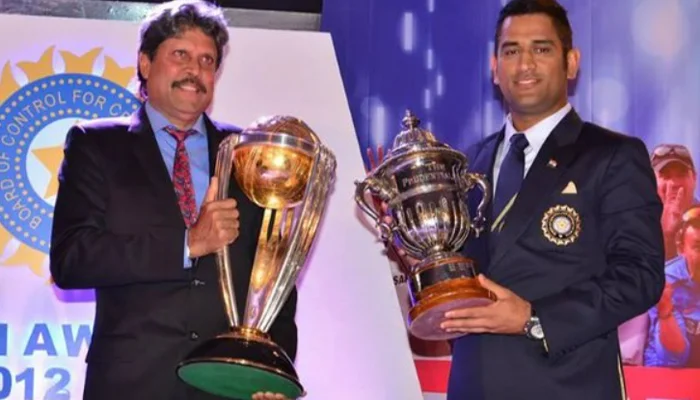
(Kapil Dev and MS Dhoni holding the 2011 ODI World Cup and 1983 World Cup Trophy)
Throughout its history, Indian cricket has navigated a rollercoaster of triumphs and setbacks. From the shadow of fixing scandals to triumphant victories over formidable opponents like the West Indies and Australia on their home turf, fans have witnessed a wave of emotions supporting their beloved team. But the two biggest things that the Indian team has achieved in the history of the game are the 1983 World Cup and the 2011 ODI World Cup which resulted in unreal progress of the Indian team and even inspired the upcoming generation to take up cricket. But here is a question as to which World Cup victory had a greater impact on Indian cricket and led to a more favourable outcome for the team.
1983 World Cup: A Story of the Underdogs
In 1975, the International Cricket Council decided to have a mega tournament where all the top cricketing teams will meet and will crown the ultimate champion of the game. The first two editions of the World Cup saw West Indies dominating the other teams in England and hence the opponents knew that defeating West Indies was always a tough task for every other team. From the first two World Cups, India was able to defeat the team named East Africa in 1975 and this was their only win in the World Cups till 1979.
Coming to the 1983 Prudential World Cup, India entered with a new team and a young captain Kapil Dev who was looking forward to getting the best out of his team. For the other players of the Indian team, the mindset was to come to England and have a month-long vacation. Players like Kris Srikkanth, Mohinder Amarnath, and others had thought that just like the previous two World Cups, it was going to be the same thing for them.
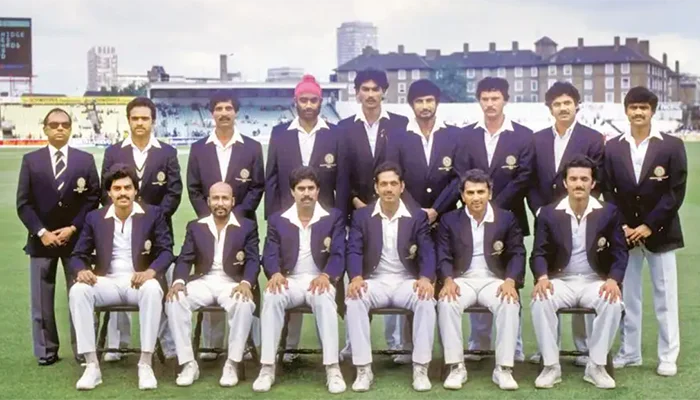
(Indian Cricket Team during the 1983 World Cup)
The first match of the Indian team was against West Indies who were the defending champions and had one of the best squads. Players like Clive Lloyd, Viv Richards, Malcolm Marshall, Andy Roberts, Joel Garner, and others, it was always tough to play against them. However, the Indian team with the mindset of Kapil Dev started the tournament well as Yashpal Sharma scored 89 runs from just 120 balls to take the team’s score to 262 runs with the loss of 8 wickets. In response to it, West Indies was bowled out for just 228 runs as Ravi Shastri had the figures of 3/26 in just 5 overs. With this win, the Indian team looked confident and hence the other teams started rating them highly.
Coming to their 2nd league match, India was playing against Zimbabwe at Grace Road, Leicester, and with the toss in India’s favour, they were selected to field first. Madan Lal proved to be the best bowler of the team as he picked up 3 wickets and gave away just 27 runs which helped the team to restrict Zimbabwe for just 155 runs in 51.4 overs. The Indian team chased down the target in just 37.3 overs as Sandeep Patil got 50 runs from the 54 balls played.
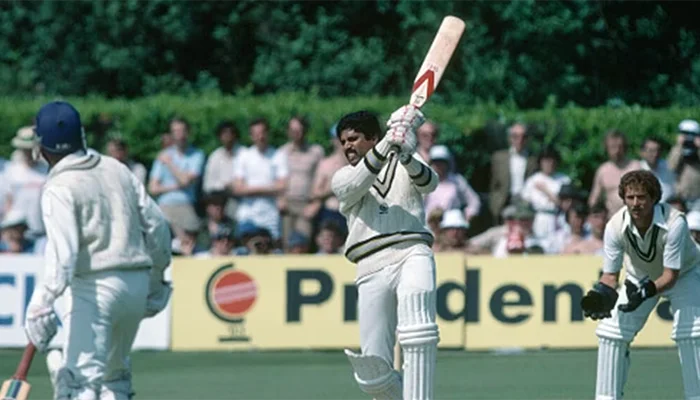
(Kapil Dev during his 175* innings against Zimbabwe in the 1983 World Cup)
With 2 wins in the first 2 matches, the Indian team was confident of making it to the next stage as they were now just 1 win away from sealing their place. However, the next match against Australia proved to be an eye-opener for the team as they lost the match by 162 runs. While batting first in the match, Trevor Chappell’s innings of 110 runs from 131 balls propelled them to a target of 320 runs with the loss of 9 wickets. In its response, the whole Indian team was bundled out for just 158 runs as Ken MacLeay got 6 wickets in the match.
After bearing a loss against Australia, India now played against West Indies in their 4th league match and it was the revenge time for the West Indies players. In the first innings of the match, West Indies made 282 runs with the loss of 9 wickets, and a century from Viv Richards allowed them to go big in the match. Coming to the run chase, India was bowled out for just 216 runs, and the 80 runs innings of Mohinder Amarnath weren’t enough to give the team a win
|
Date of the Match |
Opponent of the Indian Team |
Result of the Match |
Man of the Match |
|
9th June 1983 |
West Indies |
India won by 34 runs |
Yashpal Sharma |
|
11th June 1983 |
Zimbabwe |
India won by 5 wickets |
Madan Lal |
|
13th June 1983 |
Australia |
Australia won by 162 runs |
Trevor Chappell |
|
15th June 1983 |
West Indies |
West Indies won by 66 runs |
Viv Richards |
|
18th June 1983 |
Zimbabwe |
India won by 31 runs |
Kapil Dev |
|
20th June 1983 |
Australia |
India won by 118 runs |
Roger Binny |
|
22nd June 1983 |
England |
India won by 6 wickets |
Mohinder Amarnath |
|
25th June 1983 |
West Indies |
India won by 43 runs |
Mohinder Amarnath |
(India’s performance in the 1983 World Cup)
Now, the Indian team was in a position of bother as a loss in another match would end their World Cup campaign and hence it was a do-or-die match against the Zimbabwe team. On the pitch of Nevill Ground, Tunbridge Wells India managed to win the toss and bat first which proved to be a poor decision as soon the scorecard was 17-5 for the Indian team. But it was Kapil Dev who entered the ground with his confidence and started hitting the Zimbabwe bowlers all over the park. He ended up with 175* on the board and got India to a respectable total of 266 runs. In response to it, Zimbabwe was restricted to 235 runs and hence India won the match to stay alive in the tournament.
With the last league match against Australia, India was sure of going into the next round and in the first innings, India scored 247 runs as Yashpal Sharma made 40 runs from the 40 balls played to get India to a fighting total. In the run chase, Australia was bundled out for just 129 runs which resulted in India booking their semi-final spot against England. In the 1st Semi-Finals England batted first and posted a total of 213 runs and coming to the Indian team, they chased down the target in 54.4 overs as Yashpal Sharma scored 61 runs for the team to book the Finals berth against West Indies.
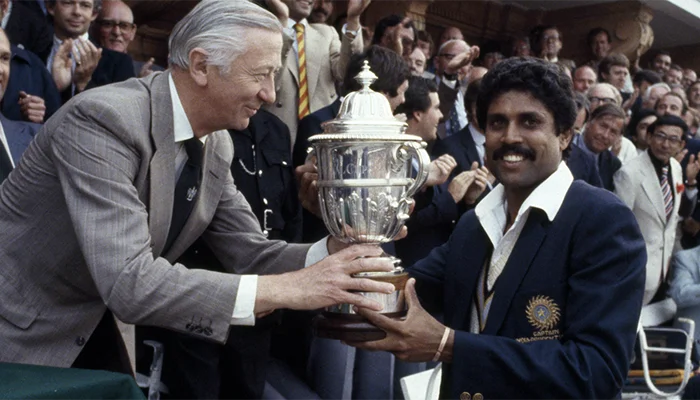
(Kapil Dev lifting the World Cup at the Lord’s balcony)
On 25th June 1983, India played in the World Cup Finals against West Indies, and on a green wicket, West Indies invited India to bat first. India’s batting order crumbled under the pressure as they posted a total of 183 runs which was a low score in the Finals. Coming to chase this, West Indies faltered at the start and a brilliant catch from Kapil Dev saw the end of Viv Richards. Mohinder Amarnath bowled a brilliant spell of 3/12 to seal the World Cup for the team.
2011 ODI World Cup: Ending the 28-year drought
After winning the World Cup in 1983, the Indian team failed to make it big in the upcoming ICC tournaments. The team managed to reach the 2003 ICC World Cup Finals but the Australian team proved to be better than the Indian team. For the 2011 ODI World Cup, MS Dhoni was given the task to end the 28-years of drought and with players like Sachin Tendulkar, Virender Sehwag, Zaheer Khan, and others, the team looked ready in the home conditions.
India played the first match of the ODI World Cup 2011 against Bangladesh where Virender Sehwag and Virat Kohli completed their centuries to post 370 runs on the board and they cleaned up the Bangladesh team for just 283 runs to secure their first victory of the tournament by 87 runs as Munaf Patel took 4 wickets for the team.
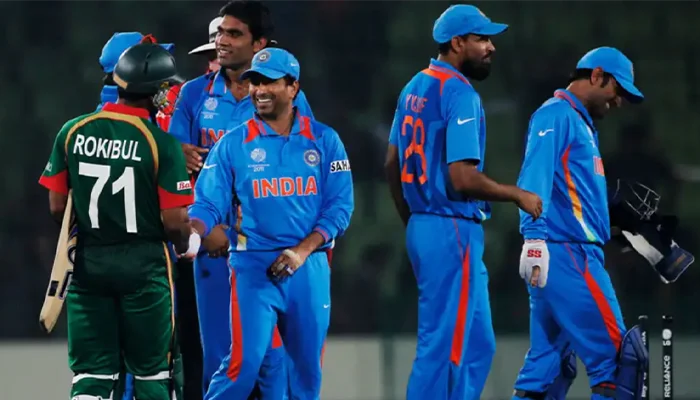
(Indian team celebrating after winning the match against Bangladesh in the 2011 ODI World Cup)
The second match of the Indian team was scheduled against the England side and it was a high-scoring contest as while batting first, Sachin Tendulkar’s century helped the team to reach a total of 338 runs in their 50 overs of the game. In response, Andrew Strauss led the team well and took the England team close to the victory line. But a spell from Zaheer Khan ensured that the team had some hiccups and hence the match ended in a draw.
The third match against Ireland was an easy one for the team as Ireland was bowled out for just 207 runs and India was looking to maintain their Net Run Rate now. They started the chase positively and at the end, it was the innings of Yuvraj Singh who scored 50 runs and gave India a win by 5 wickets to get the points in the table. After beating Ireland, the same story was repeated against the Netherlands too as Yuvraj Singh’s fifty runs along with 2 wickets helped the team to get a win by 5 wickets.
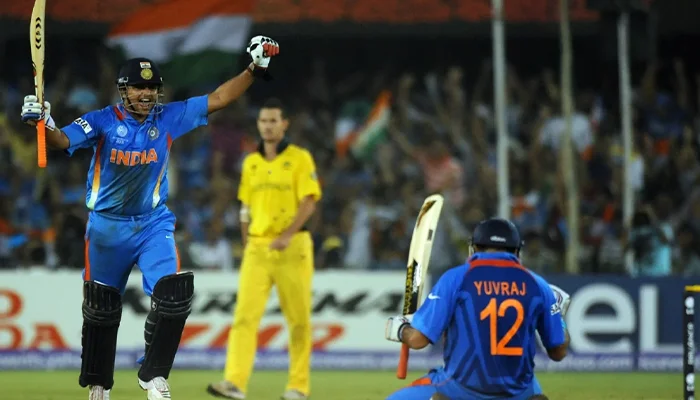
(Yuvraj Singh and Suresh Raina celebrating after knocking out Australia from the 2011 ODI World Cup)
The whole World Cup India lost just a single match and it was against South Africa despite Sachin’s century, India was able to score only 296 runs. The lower order of the team collapsed as Dale Steyn picked a 5-wicket haul for the team. Coming to the chase, South Africa got the support of Jacques Kallis and Hashim Amla who got them the target in 49.4 overs of the game.
The sixth match ODI World Cup 2011 for the Indian team was against West Indies and after losing the last match, a win was needed here. While batting first, India was in a position of bother and this is where Yuvraj Singh stepped up and scored a century to take the team to 268 runs. West Indies started the run chase well and it was Yuvraj Singh again who came in and chipped the crucial wickets to give India a win by 188 runs.
|
Date of the Match |
Opponent of the Indian Team |
Result of the Match |
Man of the Match |
|
19th February 2011 |
Bangladesh |
India won by 87 runs |
Virender Sehwag |
|
27th February 2011 |
England |
Match Tied |
Andrew Strauss |
|
6th March 2011 |
Ireland |
India won by 5 wickets |
Yuvraj Singh |
|
9th March 2011 |
Netherlands |
India won by 5 wickets |
Yuvraj Singh |
|
12th March 2011 |
South Africa |
South Africa won by 3 wickets |
Dale Steyn |
|
20th March 2011 |
West Indies |
India won by 80 runs |
Yuvraj Singh |
|
24th March 2011 |
Australia |
India won by 5 wickets |
Yuvraj Singh |
|
30th March 2011 |
Pakistan |
India won by 29 runs |
Sachin Tendulkar |
|
2nd April 2011 |
Sri Lanka |
India won by 6 wickets |
MS Dhoni |
(India’s performance in the 2011 ODI World Cup)
Having 4 wins, 1 loss, and a draw, India qualified for the Quarter-Finals and met Australia. In the first innings of the match, Australia posted a fighting total of 260 runs as Ricky Ponting scored his first century of the 2011 ODI World Cup. However, his century went in vain as India knocked out Australia because Yuvraj Singh scored another crucial half-century for the team to take them past the winning line.
One of the biggest matches of the ODI World Cup 2011 was played between India and Pakistan as it was the Semi-Finals of the tournament. India managed to bat first in the match and Sachin Tendulkar made 85 runs after getting several chances from the Pakistan fielders. Wahab Riaz picked a 5-wicket haul but the Pakistan team lost the match as they were bundled out for 231 runs as all the bowlers got them the win and booked the place in the Finals.
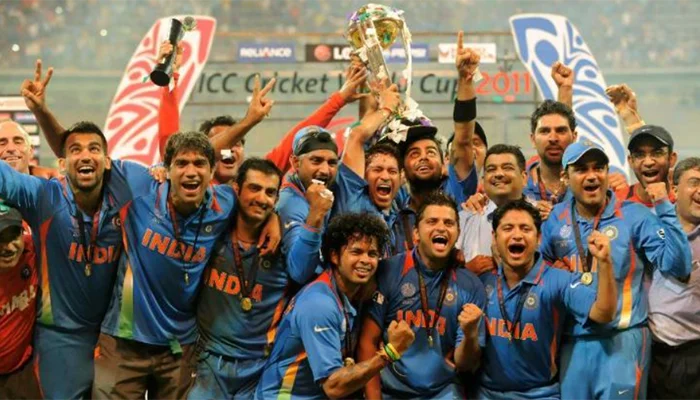
(Indian team celebrating after winning the 2011 ODI World Cup)
2nd April 2011 was scheduled to have the Finals between India and Sri Lanka at the Wankhede Stadium in Mumbai. Sri Lanka managed to bat first and got a massive score of 274 runs with the loss of 6 wickets as it was Mahela Jayawardene who scored an unbeaten century for the team. In response, India failed to start well but the partnership of Gautam Gambhir and MS Dhoni helped the team to complete the run chase. In the end, the iconic six from MS Dhoni sealed the ODI World Cup for the Indian team.
Scenes after the 1983 and 2011 World Cup wins
The 1983 World Cup was a story of an Indian team that entered the tournament as complete underdogs and no one gave them a chance to win against the teams like West Indies, England, Australia and others. With the World Cup win, the Prime Minister of India at that time, Indira Gandhi declared a public holiday after that. Moreover, with the World Cup win, India was now seen as a powerhouse of cricket and the 1987 World Cup took place in Asian conditions. Furthermore, Indian cricket saw some big stars like Sachin Tendulkar, Rahul Dravid, Sourav Ganguly and others coming into the team. It completely transformed Indian cricket and will always be an iconic moment for the Indian fans.
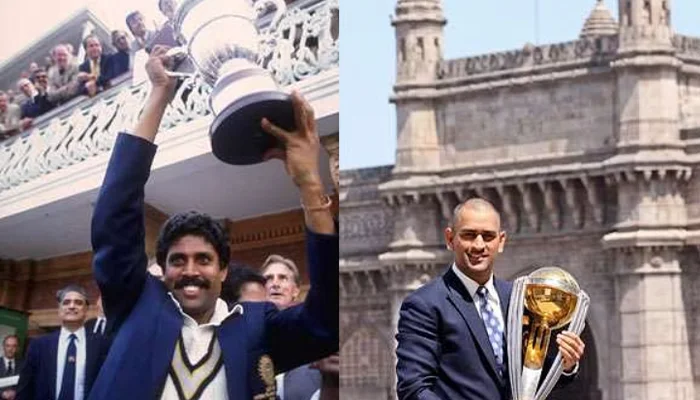
(Kapil Dev and MS Dhoni, the winning captains of the 1983 and 2011 World Cup respectively)
Coming to the 2011 ODI World Cup, the Indian team prior to it was seen as a powerful unit and an ICC Trophy was needed to stamp their authority now. MS Dhoni proved to be the best leader for the Indian team as in just 7 years of his captaincy, he gave the team 3 ICC Trophies and revolutionized Indian cricket completely. The team was now at the top of the world and it inspired the upcoming generation of the players to take up cricket. Furthermore, the 2011 World Cup win got BCCI some amazing rewards like better viewership of IPL and they became the richest cricket board.

Comments
Sign up or log in to your account to leave comments and reactions
0 Comments